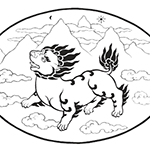| The following article is from the Winter, 1997 issue of the Snow Lion Newsletter and is for historical reference only. You can see this in context of the original newsletter here. |
(Condensed from What China Hoped Disney would Bury in the Moroccan Sand, by Jean Nathan, The New York Times, December 22,1996.)
Ms. Mathison, a screenwriter best known for E.T.: The Extra-Terrestrial, first heard of the Dalai Lama when she was a student at the University of Caiifomia at Berkeley.
I am sort of famous for little-boy stories, and this was a fantastic little-boy story, a story of destiny and nurturing and tragedy, the idea of finding a 2-year-old child and then investing in him everything that is good about human beings, your people and about your beliefs, and then asking that he try to save your country.
In 1990, she wrote a proposal and asked the actor Richard Gere, a well-known supporter of the Tibetan cause, for help in getting it to the Dalai Lama. The Dalai Lama himself wrote back to say he would be interested in discussing the project. A meeting was set up for April 1990, when he was to be in California to receive an award.
Ms. Mathison recalledthat she and her husband, Harrison Ford, went to meet the Dalai Lama at the Red Lion Inn in Santa Barbara I did a pitch, basically, she said. He said: Yes, you may do the movie. I'm going to Santa Cruz to rest for two days. Why don? you come up and we'll talk?'
They accepted that invitation, as well as the next one: to come to India.
A year after first meeting the Dalai Lama, with a draft of a screen play completed, Ms. Mathison and Mr. Ford went to Dharamsala. For six days they talked, and Mr. Ford read the script aloud to him.
His Holiness would make corrections, or his memory wouldbe jogged and he'd say, This reminds me of something' and tell us a story, Ms. Mathison said. And when Harrison got to the end of the script, his Holi ness said: Good. Very good. Very strong. Very beautiful.'
Back home, she began the process of trying to interest a director in the project. The one she wanted was Mr. Scorsese, largely because she thought the issues would appeal to him.
First of all, she said, it's the story of the male society. Secondly, the story of a loyalty to an idea and this man who had the strength, with all of the universe working against him, to stand up to that idea. The religious overtones I knew would appeal to Marty. I saw it as a story of a kind of wise guy, and I knew he would get what it was about.
She was right.
There was no doubt, said Mr. Scorsese. Whether I like it or not, a lot of my movies have religious elements or themes. But the key for me in this story is the concept of how you live a life of compassion. And I think that goes all the way back to the first lines of Mean Street: You don't make up for your sins in a church. You do it in the streets. You do it at home.'
Because of the intensity of the Chinese reaction to the project a few of those connected with the film worry that there will be repercussions for some of the Tibetans involved. There has already been some discussion of altering their names in the credits to conceal their participation. Even more troubling for the film makers is the fact that the parents of the man playing a main character still lives in China.
It's a wonderful movie and it's going to be released no matter who releases it, she said in her apartment on Central Park West in Manhattan the day the story about China's reaction to the project was emerging in The New York Times. Disney has said they're very high on it. ä_æ

